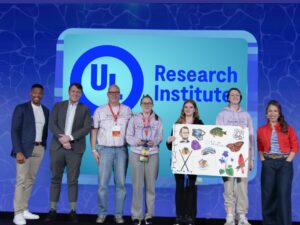Here’s Why UL Research Institutes Focuses on Individual and Societal Health in the 21st Century
Advancing individual and societal health in the 21st century is the second of three grand challenges we’re addressing

By Dr. Chris Cramer, senior vice president and chief research officer for UL Research Institutes
Advanced technology has brought about beneficial changes too numerous to catalog — our food is more plentiful, our medicines more effective, and our structures more durable because of it. Less advantageously, technology has also added a twist to the essential components of health. Even as we focus on diet and physical activity for good health, it is increasingly apparent that synthetic chemicals in our air, water, and household products likewise have a lot to do with just how healthy we actually are.
That realization is at the heart of the UL Research Institutes (ULRI) Grand Challenge No. 2, which calls for advancing individual and societal health in the 21st century — that is, in the current Anthropocene Epoch in which postindustrial revolution chemical exposures with poorly understood consequences are a part of everyday life.
In practice, this grand challenge expresses our commitment to using the tools of toxicology, analytical chemistry, molecular biology, and public health to assess how manufactured products, technologies affecting the environment, and the consequences of catastrophes such as wildfires influence our health and safety. We’re also especially excited to be deploying new genetic and cellular assessments that permit us to analyze effects on human tissues, as these provide a powerful alternative to animal models.
This second grand challenge dovetails with our first grand challenge — which seeks to build resilience for a sustainable future — as well as our third, which aims to promote safety at the human-digital interface.
The portion of our work that focuses on human exposure by necessity breaks much new ground. Anthropogenic chemicals, that is, those deriving from human activities, are ubiquitous in today’s world, especially in and around our homes: They are found in manufactured wood, paint, adhesives, insulation, drywall, and other materials used to construct and furnish buildings. They are in the textiles we wear, the vehicles we ride in, and the processed foods that we eat. Despite that ubiquity, however, we have a reasonable understanding of the human health impacts of only about 5% of the more than 140,000 chemicals presently used in the manufacture of everyday products.
In other words, there’s a lot more of what we don’t know than what we do!
We at ULRI aim to close those research gaps and develop the knowledge that will help prevent or mitigate health risks, including cognitive, reproductive, or carcinogenic effects associated with chemical exposure.
We also want to understand the different risks associated with acute versus long-term exposures, as it is becoming increasingly clear that many anthropogenic compounds — for example, per- and polyfluoroalkylated substances (PFAS) — can be extraordinarily persistent in the environment. As we learn more about chemicals of concern, we will share our findings with other researchers, institutions, governments, and consumers to encourage the development of safer products and relevant public policies.
With our safety science research, we’re proud to help to build the foundation for a healthier, safer future.
More information
See how we work to build resilience for a sustainable future:
PUBLISHED









